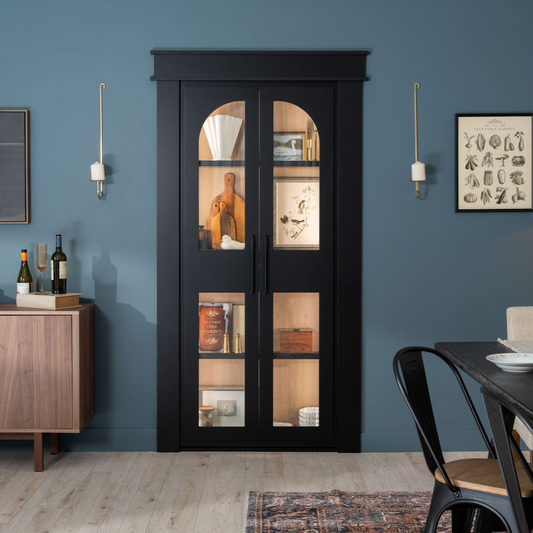Hidden Door History and Origins
Hidden doors are based on one concept: you can't steal what you can't find. And as long as humans have existed, they've had something to hide. The Egyptians used hidden doors and passageways to protect the Pharaoh's riches into the afterlife. During Elizabeth I's reign, hidden doors led to secret rooms called priest holes where Catholics could hide from the Queen’s Protestant crusaders. Today, hidden doors may lead to a panic room — or a Murphy door may lead to a hidden closet. Learn about the history of hidden doors through these snapshots of history.
Ancient Hidden Doors
According to Chinese history, the Northern Song Dynasty (960-1127 AD) battled against much stronger forces for hundreds of years, never admitting defeat. People thought the battle stories were legends. Why? Because the Song Dynasty lived on the open plains with no place to hide. In 1948, an extensive underground tunnel system was discovered, which might explain how the Song Dynasty survived. In 1951, a cave-in revealed an underground cavern with multiple doors leading to passageways that contained huts, burned candles, and heatable bricks. For this underground system to have survived without detection is a credit to the hidden doors that protected them.
Medieval Hidden Doors
A medieval castle would not be complete without hidden doors. Whether it's the never-found secret room at Glamis Castle or the secret passageway in Warwick Castle, castles keep their secrets. Warwick Castle's green room hides a secret door that opens to a stairway and passage that leads to the river. Built in the 1300s, it was most likely an escape route if the castle was under siege.
Victorian Hidden Doors
Victorians loved their secrets, and many mansions were built with secret doors. Even Queen Victoria succumbed to the desire for hidden doors. When she had the gatehouse built at Edinburgh Castle, a hidden doorway was placed behind a fireplace. As renovations began in 2020, workers discovered the secret doorway, but no one knows where the passage may lead, as many of the tunnels under the castle are no longer passable.
American Hidden Doors
While the Victorians were building their secret rooms, an American was building a three-story building full of hidden doors and secret passages in Chicago. H.H. Holmes, often considered America's first serial killer, built a house of horrors just blocks away from the World Columbian Exposition of 1893.
The building became a boarding house, but it provided lodging during Chicago's World's Fair. The structure was an architectural oddity with hidden staircases and secret rooms. Holmes built hidden doors that people could only access from the outside. The building also had trap doors that gave him access to guest rooms. By using multiple builders, he was able to keep the building's secrets to himself. The so-called Murder Castle burned to the ground in 1895, and a post office now stands on the site.
The Modern History of Hidden Doors in the 20th Century
During Prohibition, clubs went underground or — in the case of the Sir Francis Drake Hotel in San Francisco — overhead. In many places, speakeasies hid behind legitimate storefronts. People “in the know" would slide a hidden panel or move shelving to uncover a secret door, behind which were casinos, bars, and even brothels.
The Sir Francis Drake Hotel added a floor that doesn't appear on its building plans. The original 1928 elevator has a hidden keyhole that, when activated, takes you to the Prohibition floor. In addition to using the Prohibition floor, guests could order alcohol through the same pulley system that was used for room service.
If you're interested in being a part of the history of hidden doors, why not check out these options? At The Murphy Door, Inc., we provide Murphy doors for hidden spaces and storage.



